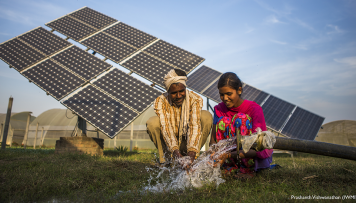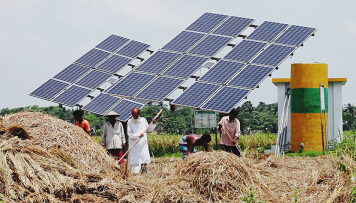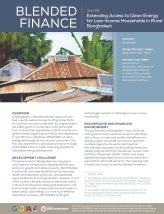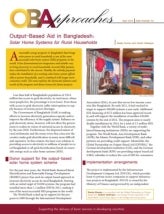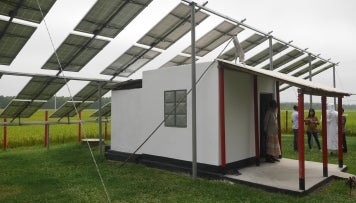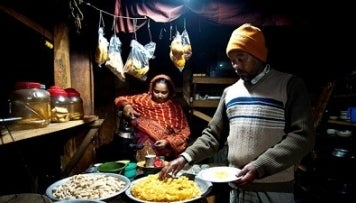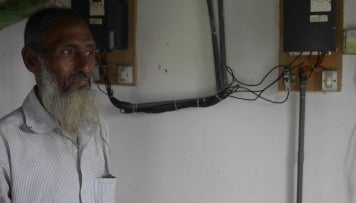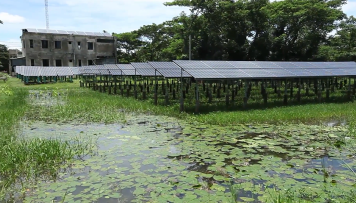
Still Image from World Bank video "Bangladesh: Women Empowered by Solar Energy"
The Sustainable Development Goal on Climate Action identifies urgent measures to combat the effects and impact of climate change. The United Nations Framework Convention on Climate Change (UNFCCC) has set specific goals and targets that stimulate action in areas of critical importance to combat human-induced climate change and its impacts. The Conference of the Parties CoP22 which took place in Marrakech, Morocco focused on making the voices of the most vulnerable countries to climate change heard, in particular African countries and island states where Climate Change poses the greatest danger to the world's poorest.
Results-based financing (RBF) allows funds to be dispersed upon achievement of predefined results. Climate change mitigation under the Paris Agreement requires countries to set quantified targets defined within their Nationally Determined Contributions (NDCs) as part of their input to address climate change. Therefore, results-based climate finance approaches provide one tool as a means to successfully mobilizing private investment, and helping to create new markets relevant for low-carbon and climate resilient economies. As part of the RBF framework, GPOBA uses the Output-Based Aid (OBA) results mechanism to improve the delivery of basic services to the poor in developing countries.
GPOBA work has contributed to achieving the climate change agenda through subsidy funding using OBA approaches primarily through renewable and energy efficiency projects in low-income areas of developing countries. As part of its strategy to become a center of expertise in RBF approaches, GPOBA has launched a new initiative to showcase opportunities in applying results-based and climate-smart financing approaches, focusing on cities and disaster risk management. In collaboration with the World Bank Climate Change group, GPOBA is mapping the whole range of Results Climate Based Financing (RBCF) approaches. The outcome of this analytical work will present a new platform for engagement in the RBF community of practice.
Over the last 13 years GPOBA has supported clean energy projects using technologies such as natural gas, solar home systems, pico-photo volatic and compact fluorescent lamps, and off-grid electricity systems to provide access to energy for low-income households. These projects in Armenia, Bangladesh, Bolivia, Colombia, Ethiopia, Ghana, Nepal, and Philippines have achieved demonstrable results (see infographic below)..
Several other organizations such as the Carbon Initiative for Development Ci-Dev are using results-based payments as a vehicle for financing energy access projects. The Pilot Auction Facility for Methane and Climate Change Mitigation uses results-based payment mechanism to set a floor price for future carbon credits in the form of a tradeable output option, which is to be competitively allocated via auctions.
A noteworthy project funded and implemented by the World Bank Group is the Moldova Biomass Heating and Energy Conservation Project. This project helped install 317 new and more efficient boilers in public buildings across Moldova, including schools, hospitals and community centers, contributing to energy savings, lowering greenhouse gas emissions, and creating better living conditions for about 40,000 people. The project is the first in the country to earn certified carbon credits, which are sold to the World Bank’s Community Development Carbon Fund (CDCF) to earn revenue which helps municipalities pay for investment in energy-efficient measures. So far, the project has reduced green-house gas emissions by 89,500 tons of carbon dioxide, equivalent to taking about 19,000 modern vehicles off the roads for a year.
The World Bank’s Climate Change Action Plan highlights the need for leveraging partnerships between the donor community, development banks, NGOs, private sector and other stakeholders to help developing countries accelerate efforts to tackle climate change and deliver on their national climate plans. Results-Based Financing mechanisms, which put funding behind partnerships and innovative market-based Instruments such as GPOBA, the Carbon Initiative for Development and the Pilot Auction Facility are making tremendous contributions to the climate action agenda.
(map below has been updated since this article was published; click map for full-resolution version)


